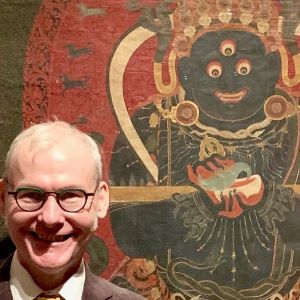Karl Debreczeny
Adjunct Lecturer of Tibetan Art
Office: 401 Kent Hall
Office Hours: M 5-6 PM
Email: kdebreczeny@rubinmuseum.org
Educational Background
PhD: University of Chicago (Art History)
MA: Indiana University (Central Eurasian Studies)
MA: Indiana University (Art History)
BA: Oberlin College (East Asian Studies)
Classes Taught
HSEA GU4815 Faith and Empire: Art and Politics in Tibetan Buddhism
Research Interests
Exchanges between Tibetan and Chinese artistic traditions; Tibetan Art; Sino-Tibetan relations;
Karl Debreczeny is Senior Curator, Collections and Research, at the Rubin Museum of Art, New
York, where he has worked since 2006. He completed a Double-Masters in Art History and
Tibetan Studies at Indiana University (1994); and his PhD in Art History at the University of
Chicago (2007). He was a Fulbright-Hays Fellow to China (2003–2004) and a National Gallery
of Art CASVA Ittleson Fellow (2004–2006). His has conducted field research in various
locations along the Sino-Tibetan border.
Selected Publications
Faith and Empire: Art and Politics in Tibetan Buddhism. (ed.) NY: Rubin Museum of Art, 2019.
The Tenth Karmapa and Tibet’s Turbulent 17th Century. (ed. with Gray Tuttle) Serindia
Publications, 2016.
The All-Knowing Buddha: A Secret Guide (with Elena Pakhoutova, Christian Luczanits, and Jan
van Alphen). Antwerp: Museum Aan de Stroom. MAS: 2014.
Situ Panchen: Creation and Cultural Engagement in 18th-Century Tibet. (ed.) Guest Editor of a
special issue of the Journal of the International Association of Tibetan Studies no. 7 (August
2013). http://www.thlib.org/collections/texts/jiats/#!jiats=/current/
The Black Hat Eccentric: Artistic Visions of the Tenth Karmapa NY: Rubin Museum of Art,
2012.
“Wutaishan: Pilgrimage to Five Peak Mountain” Journal of the International Association of
Tibetan Studies, Issue 6 (Dec 2011): 1-133. http://www.thlib.org/collections/texts/jiats/#!jiats=/06/debreczeny/


 Gregory Pflugfelder
Gregory Pflugfelder
